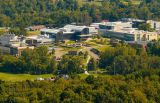MIT Researchers Train Computers To Anticipate Human Behavior With The Help Of A Television; Find Out How [VIDEO]
ByIt's no secret, artificial intelligence (AI) is capable of doing unimaginable things, however understanding how human behave is not one of those, but a team at MIT's Computer Science and Artificial Intelligence Laboratory is keen on changing that.
Their wonder drug? Television.
Basically, researchers turned computers into sofa spuds by dishing out 600 hours of footage from some of the most popular TV shows including "Desperate Housewives," "Scrubs" and "The Office," NPR reported.
Every clip was made to conclude with either one of the four actions: a hug, a kiss, a high five or a handshake. The computer was then challenged to predict which of the four aforementioned actions was about to happen.
With the aid of learning algorithm, the artificially intelligent test subjects successfully predicted the appropriate action 43 percent of the time, which is well below the 71 percent success rate from human test subjects, CNet reported.
One of the researchers of the project and a doctoral candidate at MIT, Carl Vondrick explained THIS stating human don't need ample examples of things - for instance, 'this is a kiss' - contrary to AI, human are able to grasp the message with the help of just a few examples.
What's even more commendable about this is that it can determine its own rules, Vondrick added.
The core idea behind this is to train AI to identify things like danger, crime or injury while they are still about to happen or happening. A quantum leap of that kind is still a long way off. However, taking the project's success into consideration, MIT's researchers are confident that they can move the world closer.
The most significant changes as far as AI research is concerned came through a couple of developments.
The new ability of machines to learn for themselves; in earlier generations of artificial intelligence, scientists had to feed computers the judgement and logic they believed was essential to the operation of intelligence. However, this has changed considerably over the last decade or so as scientists have pushed strongly at the frontiers of "Machine Learning."
© 2026 University Herald, All rights reserved. Do not reproduce without permission.








